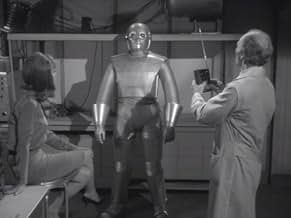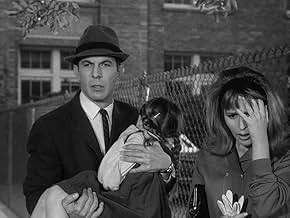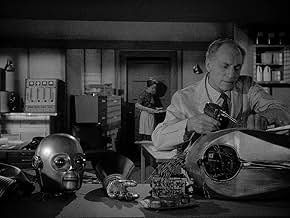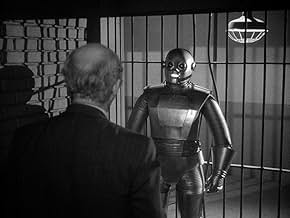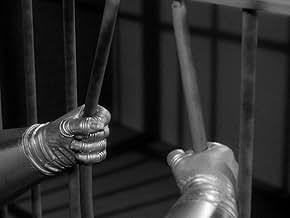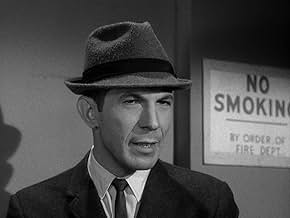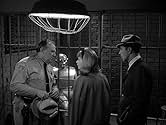A young woman hires a cynical lawyer to prove that her uncle was not killed by his invention - a sophisticated robot.A young woman hires a cynical lawyer to prove that her uncle was not killed by his invention - a sophisticated robot.A young woman hires a cynical lawyer to prove that her uncle was not killed by his invention - a sophisticated robot.
Howard Da Silva
- Thurman Cutler
- (as Howard da Silva)
John Caper Jr.
- Adam Link
- (voice)
- (uncredited)
Vic Perrin
- Control Voice
- (uncredited)
- Director
- Writers
- All cast & crew
- Production, box office & more at IMDbPro
8.0685
1
2
3
4
5
6
7
8
9
10
Featured reviews
Wow. The special effects in this one were actually very good.
This episode is rather surprising because unlike a typical episode of "The Outer Limits", the special effects appear very good--as if the budget was rather large--which it was not. It's about a robot--and for a 1960s show, the robot is quite effective. Had the robot been cheesy looking, the episode would have been a lot less effective.
The show begins with the police chasing a robot across the countryside. Apparently 'Mr. Link' is assumed to have killed its creator. But the robot gives up without a fight and the Sheriff plans on having the mechanical man disassembled. An opportunistic newspaper reporter (Leonard Nimoy) wants to exploit this as a story and convinces the dead professor's niece to get the creation a lawyer (Howard De Silva). And much of the rest of the show consists of a court hearing to determine what to do next.
All in all, an effective and interesting show. It also helped having De Silva, as he was a gifted actor. It also helped that it was written well--with a real sense of heart. My only question is how did they do this show without driving Isaac Asimov crazy?! After all, he wrote the book "I, Robot" over a decade earlier and the show had an awful lot of similarities--yet Asimov isn't credited at all. Hmmmmm.
By the way, if you see the show don't you think that the character of the little girl was amazingly stupid?! One of the only weaknesses I saw in the story, actually.
The show begins with the police chasing a robot across the countryside. Apparently 'Mr. Link' is assumed to have killed its creator. But the robot gives up without a fight and the Sheriff plans on having the mechanical man disassembled. An opportunistic newspaper reporter (Leonard Nimoy) wants to exploit this as a story and convinces the dead professor's niece to get the creation a lawyer (Howard De Silva). And much of the rest of the show consists of a court hearing to determine what to do next.
All in all, an effective and interesting show. It also helped having De Silva, as he was a gifted actor. It also helped that it was written well--with a real sense of heart. My only question is how did they do this show without driving Isaac Asimov crazy?! After all, he wrote the book "I, Robot" over a decade earlier and the show had an awful lot of similarities--yet Asimov isn't credited at all. Hmmmmm.
By the way, if you see the show don't you think that the character of the little girl was amazingly stupid?! One of the only weaknesses I saw in the story, actually.
He did it! Him! The Tin Man!
This is one of the best episodes I've seen of the original The Outer Limits, this time the only negatives being those derived from the culture and the time period. It is excessively human-centric, it oversimplifies, there are inconsistencies, it can get over-dramatic and it is *way* too obvious about the Frankenstein parallel(seriously; they literally say it several times), and that all hurts it. This is also essentially black and white, and winds up being preachy; however, after the hicks of the beginning, this does actually give arguments to both sides, and makes those that we are meant to disagree with be more than the standard one-note "evil" types. The writing isn't flawless, but it's pretty good, and manages to be clever(if not every attempt works, and some of it feels smarmy, because banter on the screen was "in" back then), and this does have points presented and lines of dialog that are memorable. Nimoy is cool as always, and the acting in general is fairly solid. While the humor varies a tad, there definitely is a laugh or two to be had in this. The effects are nice enough, and there are great details on the robot suit. I recommend this to any fan of science fiction as a forum in which to express thoughts that might seem controversial. 8/10
Of Robots and Men
Howard Da Silva stars as a cynical lawyer named Thurman Cutler who is contacted by an equally cynical newspaperman named Judson Ellis(played by Leonard Nimoy) on behalf of a young woman(played by Mariana Hill) whose inventor uncle was killed in his laboratory, and the blame has fallen on a robot he created named Adam who has been captured, and is due for destruction. Cutler gets the robot a trial, but a guilty verdict seems like a foregone conclusion in the unscientific community it occurred in. Can Adam be saved, or at least redeemed? Interesting story about robotic rights vs. human fears works reasonably well, with a fittingly ironic end.
Intelligent storytelling.
A humanoid robot, named Adam Link is out on trial for allegedly murdering his creator, Doc. The prosecution argue that Adam could have malfunctioned, the defence make the case that a robot cannot lie.
It's a staggeringly imaginative and clever storyline for the time, you can't help but wonder if a 1964 audience had any concept of the advancements in technology that would be made.
It's a very memorable episode, sixty years old, and it still makes you think, makes you wonder if we're going too far with technology.
It's nicely made, I really liked the design of Adam, simple and functional, they didn't go too over the top.
It's perhaps guilty of being a little syrupy and over sympathetic, but that I'm sure was intentional, in a bid to give Adam Link some very human like qualities.
Very well acted, Leonard Nimoy is as cool and collected as always, it's hard to be too critical here.
8/10.
It's a staggeringly imaginative and clever storyline for the time, you can't help but wonder if a 1964 audience had any concept of the advancements in technology that would be made.
It's a very memorable episode, sixty years old, and it still makes you think, makes you wonder if we're going too far with technology.
It's nicely made, I really liked the design of Adam, simple and functional, they didn't go too over the top.
It's perhaps guilty of being a little syrupy and over sympathetic, but that I'm sure was intentional, in a bid to give Adam Link some very human like qualities.
Very well acted, Leonard Nimoy is as cool and collected as always, it's hard to be too critical here.
8/10.
The Trial of Adam Link
I, Robot is directed by Leon Benson and adapted to screenplay by Robert C. Dennis from the story written by Eando Binder. It stars Howard da Silva, Ford Rainey, Marianna Hill and Leonard Nimoy. Music is by Harry Lubin and cinematography by Kenneth Peach.
Season 2 - Episode 9
Originally a very short story in Amazing Stories, it would influence Isaac Asimov and in turn see a big screen blockbuster released in 2004. Plot sees a robot named Adam Link on trial for the murder of his creator. Defence attorney Thurman Cutler (da Silva) comes out of retirement to not only try and prove Link is innocent, but to put on trial the workings of a machine in a human world, and that of the human condition of acceptance, growing and learning one self.
A super episode, one of the better entries in series 2, the messages it gives remain pertinent as ever, the court case with its legal wrangling's holds strong interest, and the finale is socko - with the closing narration striking a mighty chord. 9/10
Season 2 - Episode 9
Originally a very short story in Amazing Stories, it would influence Isaac Asimov and in turn see a big screen blockbuster released in 2004. Plot sees a robot named Adam Link on trial for the murder of his creator. Defence attorney Thurman Cutler (da Silva) comes out of retirement to not only try and prove Link is innocent, but to put on trial the workings of a machine in a human world, and that of the human condition of acceptance, growing and learning one self.
A super episode, one of the better entries in series 2, the messages it gives remain pertinent as ever, the court case with its legal wrangling's holds strong interest, and the finale is socko - with the closing narration striking a mighty chord. 9/10
Did you know
- TriviaThis episode is based on a short story by Eando Binder, which both predated and influenced Isaac Asimov. The publisher of his collection of short stories used the same title, despite Asimov's wishes.
- GoofsWhen Adam is hit by the police wagon on the cross street, a white car in the background moves backwards, indicating that the scene was shot with Adam standing up in front of the car so that it looks like he is falling when played backwards.
- Quotes
[prologue]
Control Voice: God looked upon His world and called it good, but Man was not content. He looked for ways to make it better and built machines to do the work - but in vain we build the world unless the builder also grows.
- ConnectionsFeatured in For the Love of Spock (2016)
Details
- Runtime
- 51m
- Color
- Sound mix
- Aspect ratio
- 1.33 : 1
- 4:3
Contribute to this page
Suggest an edit or add missing content

